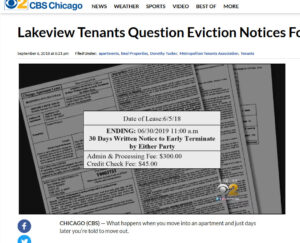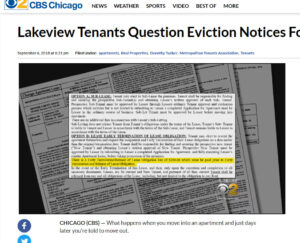 CBS Chicago Channel 2 presented a story yesterday about a management company that is attempting to mass-terminate the leases of tenants in a building it allegedly intends to renovate. At issue is a provision of the lease seemingly allowing the landlord to terminate the lease on 30 days advance notice. What kind of law is involved here?
CBS Chicago Channel 2 presented a story yesterday about a management company that is attempting to mass-terminate the leases of tenants in a building it allegedly intends to renovate. At issue is a provision of the lease seemingly allowing the landlord to terminate the lease on 30 days advance notice. What kind of law is involved here?
Well, let’s look to the Chicago Residential Landlord and Tenant Ordinance (CRLTO). Section 5-12-140 of the Ordinance provides some rules for rental agreements. Specifically, Section 5-12-140(g) likely applies here. The ordinance states, in part:
5-12-140 Rental Agreement
Except as otherwise specifically provided by this chapter, no rental agreement may provide that the landlord or tenant:
(g)Agrees that either party may cancel or terminate a rental agreement at a different time or within a shorter time period than the other party, unless such provision is disclosed in a separate written notice;
A provision prohibited by this section included in a rental agreement is unenforceable.
The tenant may recover actual damages sustained by the tenant because of the enforcement of a prohibited provision. If the landlord attempts to enforce a provision in a rental agreement prohibited by this section the tenant may recover two months’ rent.
So, a landlord cannot provide in a rental agreement that one party to the lease can cancel or terminate the agreement at a different time or within a shorter period than the other party UNLESS the provision is in a separate written notice. The goal here is obviously to avoid a tenant getting caught in a situation where a landlord has a 30 day kick-out clause and the tenant does not and the tenant is unaware of such a provision. Per the news report, let’s take a look at the purported lease provision.
 The provision indicates “30 Days Written Notice to Early Terminate by Either Party”. On its face, that provision seems to be in line with the ordinance. While a tenant might not like it, both parties had the same right to terminate, so it would not seem to be in violation of 5-12-140(g) and while it could be seen as harsh of the landlord to exercise the right, it could be argued to be in accordance (all other things such as service of the notice being valid, etc.) with the law.
The provision indicates “30 Days Written Notice to Early Terminate by Either Party”. On its face, that provision seems to be in line with the ordinance. While a tenant might not like it, both parties had the same right to terminate, so it would not seem to be in violation of 5-12-140(g) and while it could be seen as harsh of the landlord to exercise the right, it could be argued to be in accordance (all other things such as service of the notice being valid, etc.) with the law.
But, there is more to it than that. A representative of the Metropolitan Tenants Organization is quoted to say that “Under the Residential Landlord Tenant Ordinance, any early termination clause in a lease needs to give the landlord and the tenant equal termination powers”. The representative points out that the lease provides that if a landlord exercises an early termination, there is no cost to the landlord but if a tenant exercises, there is a $200 fee which must be paid. Here’s a look at the lease provision from the CBS2 story (highlight added):
 This leads to an interesting legal conundrum. I don’t agree with the MTO spokesman’s characterization of what the CRLTO says. As my readers can see, 5-12-140 only provides that a separate rider is necessary if the rental agreement “agrees that either party may… terminate a rental agreement at a different time or within a shorter time period than the other party”. Both parties had a 30 day right to terminate. The ordinance does not mention anything about the “termination powers” being equal. It only mentions the time. Further, I’m not sure that the verbiage contained in the section entitled “Option B: Lease Early Termination of Lease Obligation” is actually part of the “30 Days Written Notice to Terminate by Either Party” provision on the front of the lease. It is ambiguous at best. Obviously, I don’t have all of the facts or all of the lease to review, so I can’t offer any opinion at all as to how this case will turn out except to say that the Chicago Residential Landlord and Tenant Ordinance is, in practice, slanted in favor of the tenant. In fact, the ordinance expressly states in part (bold emphasis added):
This leads to an interesting legal conundrum. I don’t agree with the MTO spokesman’s characterization of what the CRLTO says. As my readers can see, 5-12-140 only provides that a separate rider is necessary if the rental agreement “agrees that either party may… terminate a rental agreement at a different time or within a shorter time period than the other party”. Both parties had a 30 day right to terminate. The ordinance does not mention anything about the “termination powers” being equal. It only mentions the time. Further, I’m not sure that the verbiage contained in the section entitled “Option B: Lease Early Termination of Lease Obligation” is actually part of the “30 Days Written Notice to Terminate by Either Party” provision on the front of the lease. It is ambiguous at best. Obviously, I don’t have all of the facts or all of the lease to review, so I can’t offer any opinion at all as to how this case will turn out except to say that the Chicago Residential Landlord and Tenant Ordinance is, in practice, slanted in favor of the tenant. In fact, the ordinance expressly states in part (bold emphasis added):
5-12-010 Title, Purpose and Scope
This chapter shall be known and may be cited as the “Residential Landlord and Tenant Ordinance”, and shall be liberally construed and applied to promote its purposes and policies.
It is the purpose of this chapter and the policy of the city, in order to protect and promote the public health, safety and welfare of its citizens, to establish the rights and obligations of the landlord and the tenant in the rental of dwelling units, and to encourage the landlord and the tenant to maintain and improve the quality of housing.
So, could a judge read into section 5-12-140(g) that a lease provision giving the right to terminate must provide for equal powers between a landlord and a tenant or it would be void absent a separate writing? Maybe. More importantly, the situation is illustrative of how the CRLTO applies to the day-to-day lives of landlords and tenants, the problems of ambiguous CRLTO provisions given the intent of the ordinance, and the problem of ambiguous lease provisions. This will be an interesting case to watch.
